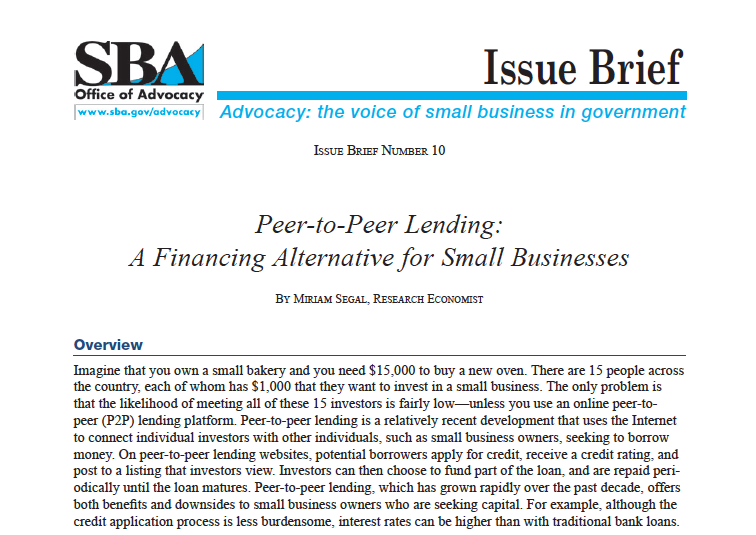SBA Offers Balanced Review of Alternative Small Business Lending
 In response to the Treasury’s RFI, I expect many industry commentators to encourage potential government regulators to engage in a careful review of the small business finance market before deciding on a course of action. As an example of the type of review necessary, these commentators could highlight the recent issue brief published by the SBA Office of Advocacy entitled “Peer-to-Peer Lending: A Financing Alternative for Small Businesses“.
In response to the Treasury’s RFI, I expect many industry commentators to encourage potential government regulators to engage in a careful review of the small business finance market before deciding on a course of action. As an example of the type of review necessary, these commentators could highlight the recent issue brief published by the SBA Office of Advocacy entitled “Peer-to-Peer Lending: A Financing Alternative for Small Businesses“.
While the scope of the paper is limited to P2P loans used for business purposes, it explains how alternative small business lenders are expanding access to capital:
Compared to traditional loan products, marketplace loans feature decreased search costs; this is a result of the proprietary credit scoring algorithms that the lending platforms use. This decrease in costs makes it economical for lenders to provide smaller and/or shorter-term loans to firms on which less information is available. Such firms may include those that are younger, less established, have a shorter credit history, lack collateral, or may be in acute financial distress (e.g., imagine that you own a bakery and your only oven stops working).
The paper recognizes that alternative lenders are able to offer financing to small businesses that previously had no way of obtaining working capital, a fact that is often misunderstood or disregarded by industry critics. The paper also explains some of the reasons why alternative small business loans charge higher rates when compared with other types of loans:
[E]ven controlling for observable borrower characteristics, loans for small businesses were more than 250 times more likely to perform poorly than loans for other purposes, which may give some insights into why such loans are charged a higher rate. Put simply, investors require a higher payoff in order to fund these riskier loans, and for some small businesses, an expensive loan may be better than no loan.
Overall, the paper is a evenhanded assessment of a complex topic. It highlights how alternative lenders have increased credit availability for small business owners while explaining the economics behind the rates charged. And as the policy discussion regarding marketplace lenders begins, explaining these facts will become increasingly important.
Last modified: September 15, 2015






























